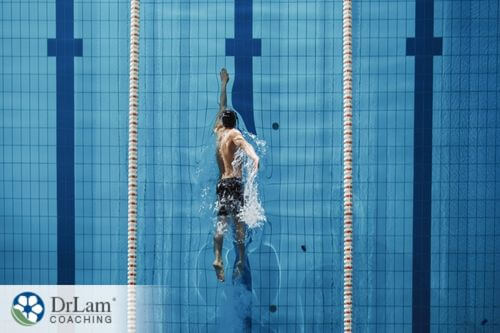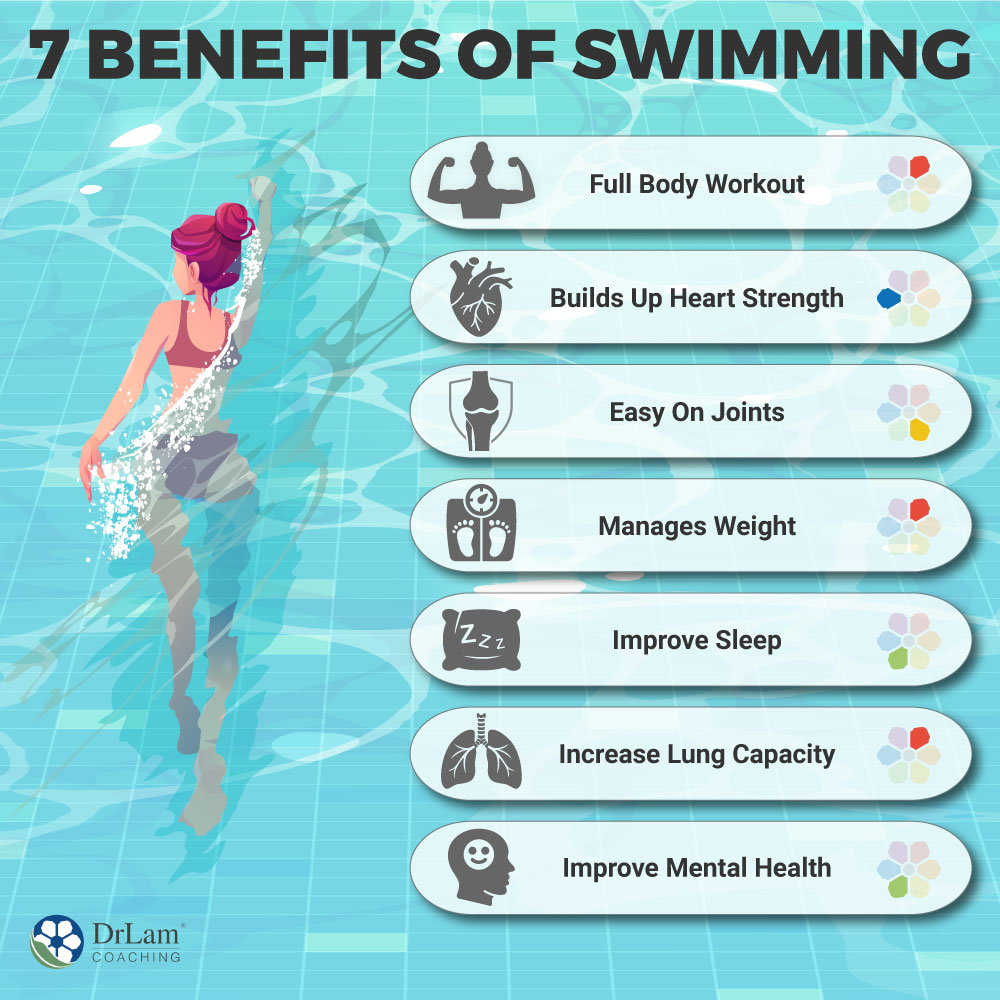 Swimming is a popular sport in the summer months, and if you are willing to brave the indoor swimming pool or wear a wetsuit, you can enjoy swimming all year round. Swimming is a low-impact form of exercise that can be great for your joints and help people with many different conditions enjoy the benefits of exercise. This article will take a look at the benefits of swimming and how it can enhance your health.
Swimming is a popular sport in the summer months, and if you are willing to brave the indoor swimming pool or wear a wetsuit, you can enjoy swimming all year round. Swimming is a low-impact form of exercise that can be great for your joints and help people with many different conditions enjoy the benefits of exercise. This article will take a look at the benefits of swimming and how it can enhance your health.
Swimming is a water activity that can be practiced in groups or individually. It can be done competitively but can also be done for enjoyment and fitness. There are multiple different strokes of swimming which refers to the movement of your limbs and placement of your body. The most common strokes include the breaststroke, backstroke, freestyle, and butterfly.
Swimming has multiple benefits that can improve your physical health as well as your emotional and mental health.
Swimming is one of the few exercises that can work multiple different muscles at the same time. Certain activities, such as running or walking, focus mainly on certain muscle groups. Swimming, however, targets multiple different muscle groups. The different strokes of swimming further target different groups of muscles.
The breaststroke targets the shoulder, arms, and chest muscles. Freestyle targets the arm and back muscles. Meanwhile, the backstroke targets the back muscles, and the butterfly targets the arm and shoulder muscles. All the strokes involve leg action, and the muscles predominantly exercised are the thigh, calf, and glute muscles.
With swimming, you are using your limbs to move your body across a length of water. The water provides a form of resistance, and this helps to activate your muscles. For all your muscle groups to benefit, it is best to practice a combination of the different strokes.
By working multiple muscle groups in your body, swimming helps to:
Swimming is a form of cardio exercise, which means that it can not only exercise your muscles but also your heart. This helps to keep your heart strong and healthy. Studies suggest that swimming can help to reduce blood pressure as well as reduce the risk of death from heart-related conditions.
Many individuals, such as those experiencing arthritis and injuries, find many exercises difficult. One of the main reasons for this is that many exercises are high-impact, meaning that your feet, hands, or both leave the ground and come back down, causing an impact. This can worsen the pain of an injury.
Swimming is a great alternative for these individuals as it is low impact. Instead of your body repetitively hitting a surface such as while running or walking, you are moving through the water. This provides a gentle yet effective form of exercise that can also help to reduce pain from these conditions.
Studies researching the effects of swimming on individuals with arthritis suggest that swimming not only helps to reduce pain, but the benefits of swimming in terms of pain management were reportedly the same as the benefits from cycling.
 Swimming, when practiced over a length of time at a moderate pace, can help you burn energy. This increases the total energy you burn per day. If you consume less than this amount, it will assist in losing weight. Research suggests that more energy is burned through swimming than through other low-impact exercises such as walking and yoga.
Swimming, when practiced over a length of time at a moderate pace, can help you burn energy. This increases the total energy you burn per day. If you consume less than this amount, it will assist in losing weight. Research suggests that more energy is burned through swimming than through other low-impact exercises such as walking and yoga.
Swimming also helps you to increase your muscle mass. This increase in muscle will increase the total rate at which you burn energy. This will increase the chances of you consuming less than what you are burning and will assist in weight loss and weight management.
Experiencing sleep disturbances such as insomnia or waking up frequently during the night can wreak havoc on your life. Swimming can help to provide a solution to sleep disturbances. During swimming, your body uses energy which can help make your muscles and body more tired.
The temperature of the water can also help to improve your sleep habits. If you are swimming in a cold water pool, the colder temperature may make you feel more tired than usual. This is because your body is working harder to maintain your body temperature. Warmer water can also make you feel tired as the warm water dilates your blood vessels. The blood is then able to flow closer to your skin to cool you down. This process also uses more energy and can leave you feeling tired after.
Swimming is also a great activity to improve your lung health. When you swim, especially when you practice freestyle, breaststroke, and butterfly, it involves holding your breath for a specific period. This helps to improve your lung capacity and can help you get in control of your breathing. This control of your breathing can help individuals with asthma and other lung conditions. It can also have a calming, meditative effect.
There are multiple benefits of swimming to your mental health and it not only helps improve your mood but also the health of your brain.
During swimming, your brain releases hormones that act as natural anti-depressants. These hormones help to boost your mood and can relieve depression and anxiety.
The color of the water also may play a part in enhancing your mental health. Water is generally a blue color, and the color blue may give a feeling of peace and tranquility and can reduce anxiety as well as aggression.
In addition, swimming can also enhance your brain health. Swimming involves submerging your body in water, and this helps to increase the flow of blood to your brain. This helps to bring nutrients to the brain and removes waste products and toxins.
Furthermore, especially if you join a swimming group or club, swimming can help you meet new people and make friends. This helps to reduce any feelings of loneliness and can help to reduce depression and anxiety.

If you have decided to start swimming and gain the benefits of swimming, make sure that you:
 Adrenal Fatigue Syndrome (AFS) is a cluster of symptoms that arise due to chronic stress. Your body can deal with short-term stress through your adrenal glands and the NeuroEndoMetabolic (NEM) Stress Response System. Your adrenal glands release stress hormones in response to stress and the NEM supports your adrenal glands.
Adrenal Fatigue Syndrome (AFS) is a cluster of symptoms that arise due to chronic stress. Your body can deal with short-term stress through your adrenal glands and the NeuroEndoMetabolic (NEM) Stress Response System. Your adrenal glands release stress hormones in response to stress and the NEM supports your adrenal glands.
When you start to experience long-term stress, your adrenal glands can become depleted, and imbalances in your NEM start to occur. There are six circuits of related organs and systems in the NEM system, and the symptoms will change according to where the imbalance is.
The one circuit in the NEM System is the Cardionomic circuit. Your adrenal glands, cardiovascular system, and autonomic nervous system make up this circuit. If there is an imbalance in this circuit, it can cause dizziness, breathlessness, and changes in blood pressure and heart rate.
To help relieve the symptoms, there are a few remedies you can use, and one of these remedies is swimming. Swimming can help you get in control of your breathing and can help regulate your blood pressure and heart rate.
Whilst there are multiple benefits of swimming, and it can benefit individuals who have an imbalance in their cardionomic circuit, there are a few cautions to be aware of. When you have AFS your body can be very sensitive to any new ingredients, materials, or products. This can cause your body to react negatively and can lengthen your healing time. If you plan to swim in a public pool, chat with your healthcare provider regarding the chemicals that may be used in the pool as your body may react to them.
Also, before you swim, chat with your healthcare provider to ensure that you receive medical clearance before you plan to swim. When you do swim, do not swim if you are dizzy, and make sure that you are not alone whilst swimming. Do not overdo exercise with AFS, as overexercising can cause your body to release additional cortisol and potentially suffer an adrenal crash.
There are many benefits of swimming, and it can help to enhance your:
However, talk to your doctor if you have AFS or are currently experiencing dizziness, breathlessness, and a rapid heart rate before swimming. If you are looking for additional exercise ideas for your health conditions, you can chat with our team at +1 (626) 571-1234 for a free initial call or click here.
Some of the benefits of swimming such as the benefits to sleep and mental and emotional health can be immediate. However other benefits, such as changes in body composition and improvements in lung health, take time. In order to see these benefits, it’s important to practice swimming consistently.
